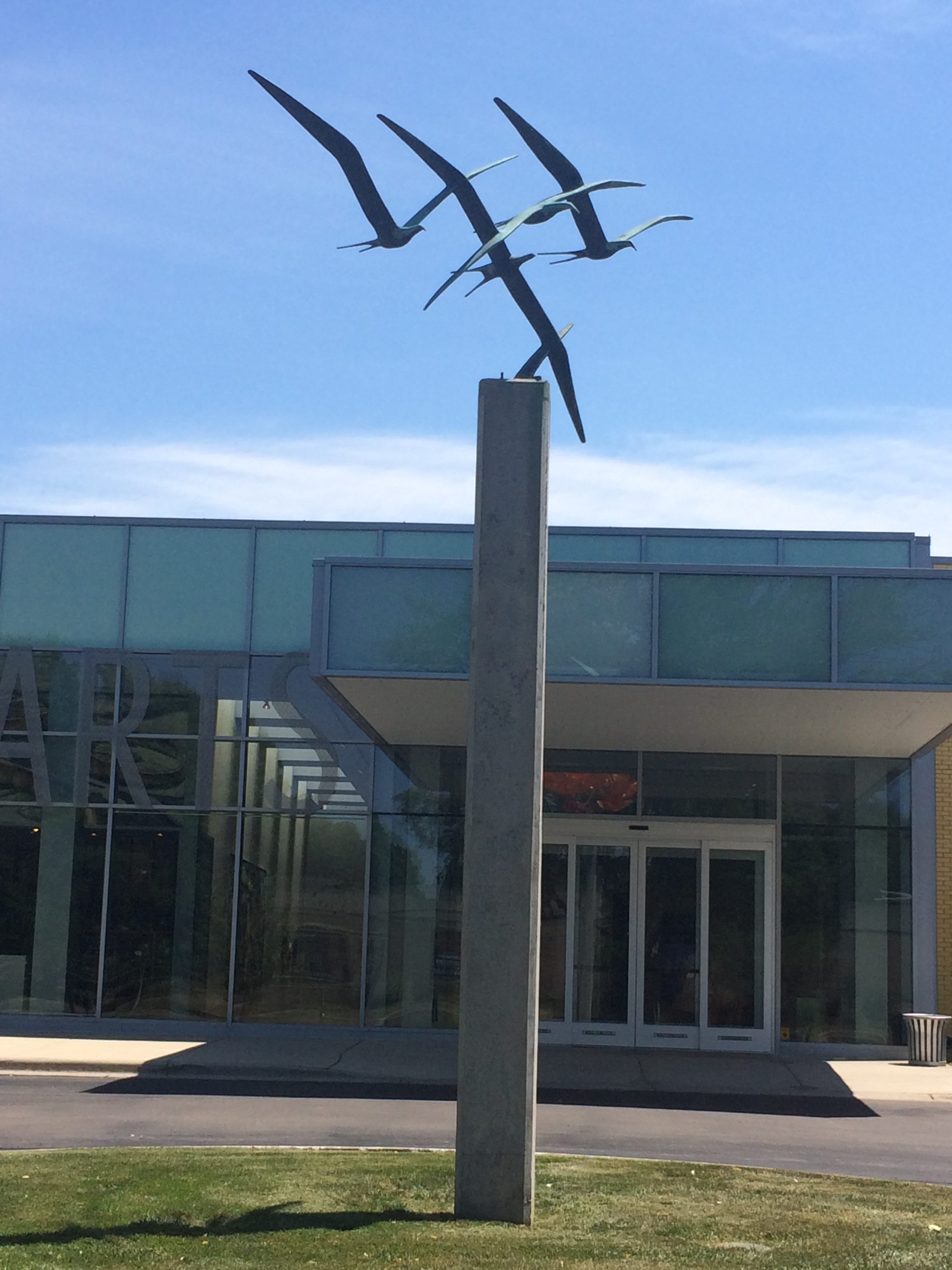By Jan Worth-Nelson
The Flint & Genesee Chamber of Commerce (FGCC) and the Board of Education of the Genesee Intermediate School District (GISD) both endorsed the proposed Genesee County Arts Education and Cultural Enrichment millage proposal up for a county-wide vote Aug. 7 in statements issued this week.

Longway Planetarium and east side of Flint Institute of Art (Photo by Jan Worth-Nelson)
The .96 mill, 10-year proposal, estimated to yield about $8.7 million per year for the Flint Cultural Center organizations, the Greater Flint Arts Council, Berston Fieldhouse and the New McCree Theatre, would cost the average homeowner in Genesee County about $48 per year on a home assessed at $50,000, and would mean free or discounted admission and other program benefits for area residents.
“Arts and cultural institutions are a vital component of a vibrant and thriving metropolitan region,” said Chamber of Commerce CEO Tim Herman in the endorsement press release. “We’re very fortunate to have such a rich mix of institutions. This millage will allow us to build on that proud legacy by providing greater access for residents and more reasons for non-residents to take a fresh look at Flint & Genesee.”
The GISD board endorsement, delivered via a unanimous resolution passed June 12 but held for public release until after the July 4 holiday, stated the board supports the proposal because “arts education is an integral part of the development of students and arts education, and engagement in the fine arts are an essential part of the school curriculum and an important component in the educational program of every student in the Genesee Intermediate School District.”
It further states the proposal would provide “new and important support to improve arts education” for students throughout the district. The resolution was signed by Cindy A. Gansen, GISD board president.
Randall Thompson of Fenton, president of Citizens for a Better Genesee County, a volunteer group founded last year to propose and promote the millage, cheered this week’s two endorsements as “a huge step forward.”
How it’s supposed to work
If passed, the millage revenue would be distributed each year from taxpayers to the county to the Flint Cultural Center Foundation, which would allocate it to the Flint Institute of Arts, the Sloan Museum, the Whiting Auditorium, the Capitol Theater, the Flint Youth Theater, the Flint School of performing Arts, the Longway Planetarium, the Flint Symphony Orchestra, the Flint Institute of Music, the Friends of Berston Fieldhouse, and the New Floyd J. McCree Theater.
Though arts officials say all amounts to be distributed are still estimates, The Greater Flint Arts Council (GFAC) expects to receive a separate distribution of about $88,000 for operating costs plus $500,000 to distribute in grants to organizations throughout the county providing arts programming, according to Greg Fiedler, long-time president and CEO of GFAC.
Berston and McCree each would receive about $400,000 per year, according to Fiedler and Thompson.

Entrance to the Sloan Museum, one of the Cultural Center organizations that stands to benefit if the millage passes (Photo by Jan Worth-Nelson)
The institutions within the Flint Cultural Center Corporation would receive funds proportionate to their operating budgets, according to Thompson and Mark Sinila, executive director of the Flint Cultural Center Foundation–an administrative entity separate from the Flint Cultural Center Corporation itself.
Citizens voice concerns on transparency, accountability
The endorsements come amid a raft of questions and concerns, prominently, for example, in the public Facebook group Flint Strong, which has 12,600 members and has been abuzz with debate about the arts millage for the past several weeks.
Many participants in the Flint Strong conversation–some combative–have complained about what they see as a lack of transparency by the millage campaign committee and arts officials and designs for accountability in the distribution and use of the revenue if the millage passes.
Neither Fiedler or Thompson were able to produce a memorandum of understanding (MOU) detailing the distributions, though several other sources said it exists.
Flint attorney Linda Pohly detailed some of her concerns in a commentary for EVM here. She noted that if passed the millage would be the county’s third largest, after millages for general county operations and that which supports the Genesee Health Plan. It would be more than the tax imposed on the Genesee County Parks system and “millages for emergency medical services, veterans’ services, MSU Extension services, and animal control services, combined.”
Thompson responded with a series of detailed replies on Flint Strong. In followup with EVM, he said in his view the real argument is the “great return” on the taxpayers’ investment in the arts and in the community.
“In just one visit for a family of four to the Cultural Center, you would get all your tax money back,” he noted. “And if you include your kids’ field trips, visits on the fly, any of the programming, you’re receiving way more than had you paid your own way.” [For example, tickets to the Sloan Museum in the Flint Cultural Center are $5 for adults, $4 for seniors, (60+), $3 for youth ages 2-11, and free for members. Children 1 and younger are free.
Tickets to Sloan Museum at Courtland Center Mall are $10 for adults, $9 for seniors, (60+), $7 for youth ages 2-11, and $3 for members. Children 1 and younger are free].
“This increases access to kids—a positive narrative for our community. It’s not overly outrageous, it’s cost efficient, it’s cost effective. This can only be good for Genesee County. For as much as Genesee County has had to suffer, I think this is a great news story,” Thompson said.
Changes in charitable giving call for new funding models, campaigners assert
Thompson said one propelling motivation for the millage is the reality that due to changes in the tax code of charitable giving and the unreliability of high-end donors–many of whom are in a passing generation — he and others believe the arts organizations need to plan for expected decreases in the traditional means of support.
“The days of the wealthy supplying all the arts and cultural initiatives for the community are antiquated,” the GFAC’s Fiedler added. “If you want a seat at the table and if you want to make part of the decision about what happens in your community, then you need to make your voice heard and you need to bring your cash to the table. The millage is equitable –it’s not all on the one percent, and the one percent won’t be running everything.”
In terms of accountability, Sinila stated the Foundation “fulfills its reporting and administration obligations by distributing the funds by the agreed upon allocation. Each recipient will file 990s [the yearly federal reporting form required of all non-profit (501-c-3) agencies] that are available to the public and subject to a public audit as determined by the county commissioners.”
Thompson and Fiedler noted that proposals for enhanced accountability to the public, if the millage passes, are on the table including appointment of an ombudsman to oversee implementation and assuring community representatives on the board of all the agencies–as they already are, Fiedler and Thompson contended.
Town Halls scheduled
Thompson announced two town halls have been scheduled to further air concerns and address voters’ questions. They are scheduled for:
7 p.m. Thursday, July 19 at the New McCree Theater, 2040 W. Carpenter Rd.
7 p.m. Tuesday, July 24 at The Whiting auditorium, E. Kearsley Street.
Thompson said he welcomed feedback from the public about the proposal and its implementation. He said the specifics had been evolving “organically” adding, “I want to please everybody–I want everybody to be happy.”

Entrance of the Flint Institute of Arts (Photo by Jan Worth-Nelson)
In an email to Chamber of Commerce members from C0fC public policy committee co-chairs Wen Hemingway, president of Baker College of Flint; and Kyle McCree, community affairs area manager for Consumers Energy, said, “The millage approval would help bolster Flint & Genesee’s reputation as a great place to live, work and raise a family. It would deliver tangible benefits to current residents while offering incentives for non-residents, including prospective employers, who are considering relocating here.”
Who are Citizens for a Better Genesee County?
In response to questions from Flint Strong, Thompson said he is not being paid for his work, and listed the following members of the Citizens for a Better Genesee County: Jimmy King, Pete Hutchinson, Dave Ralph, Sheila Miller Graham, Lynne Hurand, Michael Kelly, Louis Hawkins, Shirley Henderson, Melinda Anderson, Larry Simpson, James Shelley, Judy Alexander, Valerie Horton, Colleen Thompson, Ernelle Taylor and John Koegel. He said Fiedler and Charles Winfrey, executive director of the McCree Theatre also joined in.
“All these people are very supportive of the arts and have the best of intentions regardless of what some may think,” Thompson wrote on Flint Strong. “These are just really good people who want to make our county a better place. Some just hate the divisiveness of how everything becomes politicized these days. Republicans v. Democrat, Black v. White, City vs. Suburb, etc. We did our best to overcome all of those things with this proposal as we have representation from all over the spectrum.
“This is not a conspiracy,” Thompson said, “we’ve listened every step along the way.” A former top aide in both the U.S. Congress and State of Michigan who now runs his own marketing firm, Thompson said this is his first millage campaign.
The millage proposal was approved for placement on the ballot in April by the Genesee County Board of Commissioners on a 5-3 vote after a series of negotiations that added in provisions for the Greater Flint Arts Council, Berston and McCree Theatre to be included in the revenue disbursements–a signal early on, Thompson said, that millage advocates were serious about including underserved areas and as Sinila put it, “to extend benefits to every corner of the county.”
“Here’s what this millage is about,” Fiedler said, “This is a chance for the public to decide whether it values what’s being offered in the arts community and if they want to see it continued.”
EVM Editor Jan Worth-Nelson can be reached at janworth1118@gmail.com.


You must be logged in to post a comment.